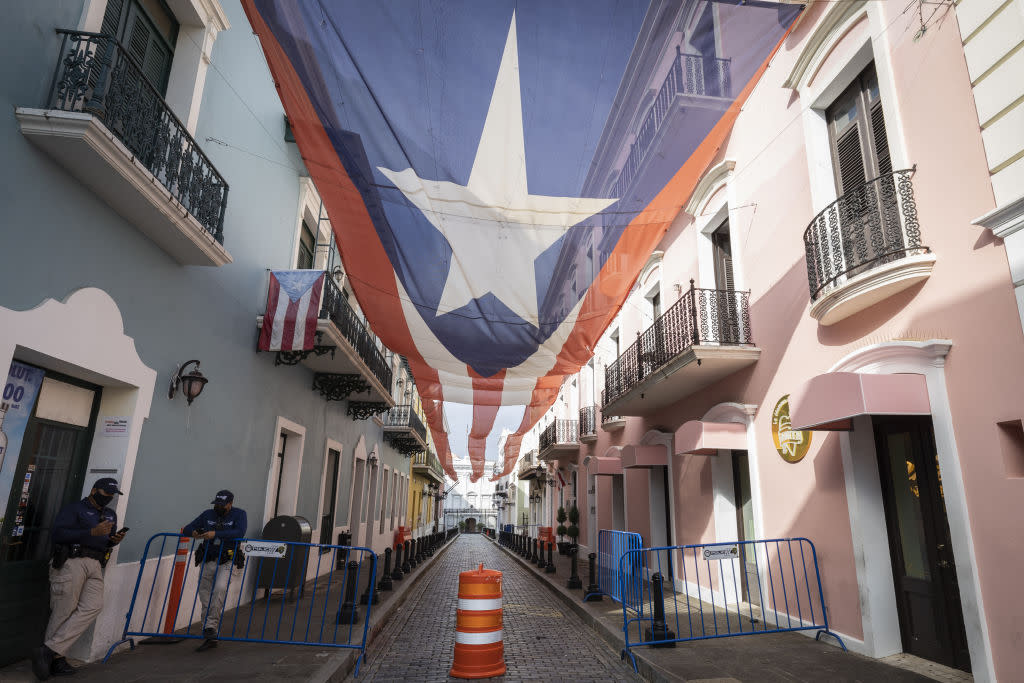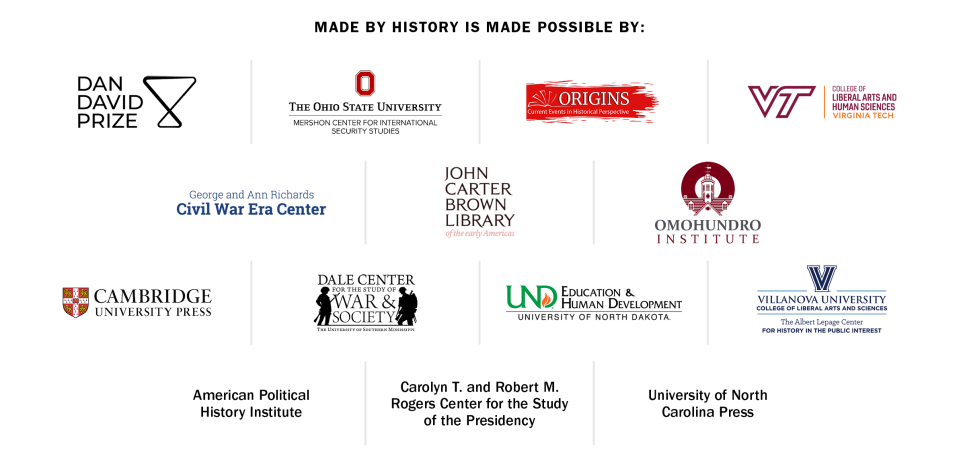Puerto Rico is Voting for its Future

The Puerto Rican flag is seen outside the Governor's residence as Puerto Ricans vote in the general election in San Juan on Nov. 3, 2020. Credit - Alejandro Granadillo —Anadolu Agency via Getty Images
Puerto Rico is participating in the U.S. presidential primaries in late April: Republicans selected delegates for the Republican National Convention (RNC) on April 21, and Democrats hold their primaries a week later. While Puerto Ricans cannot vote in the general election despite being U.S. citizens, they do have the power to shape presidential contests. Puerto Rico will send 23 delegates to the RNC, while Democrats will have 56 delegates from Puerto Rico at the Democratic National Convention. This is more delegates than many states have at party conventions.
This contest won’t affect the outcome of the primary—Donald Trump and Joe Biden will go head-to-head in November 2024. But voters will also have a chance this year to shake up the local political landscape in Puerto Rico—and its relationship to the United States. To understand what is shifting in Puerto Rico in the 2024 elections, we have to better understand the country’s history and its colonial relationship to the United States.
Often referred as the world’s oldest colony, Puerto Rico’s history is marked by five centuries of colonialism, stretching to the Spanish conquest in 1493. The Spanish colonial system was sustained by labor exploitation, enslaved-labor, and fiscal policies that were detrimental to those living in Puerto Rico. After the Spanish-American War, the United States colonized Puerto Rico in 1898. The archipelago went from one imperial power to another.
Read More: How to Fix America's Shambolic Elections
Following the U.S. occupation in Puerto Rico, there were debates among U.S. intellectuals, elected politicians, and journalists about the nature of Puerto Ricans, and whether they could ever be considered “Americans.” With much attention paid to the non-Anglo nature of the archipelago’s inhabitants, Puerto Ricans were characterized as inferior, alien, and too savage for self-government or annexation.
After years of advocacy by different groups in Washington and the archipelago, the U.S. Congress passed the Jones-Shafroth Act in 1917, granting U.S. citizenship to Puerto Ricans, which gave them freedom of movement within the United States. Despite being U.S. citizens, however, Puerto Ricans in the archipelago were and remain unable to participate in presidential elections, underscoring the second-class nature of their citizenship.
At the dawn of America’s Cold War after World War II, Puerto Rico was put in a glass case to display the wonders of U.S. capitalism to nations across the globe that were pushed to pledge allegiance to either the Soviet Union or the United States. Meanwhile, Puerto Rican nationalists challenged U.S. colonialism through armed rebellion. Some, for example, organized an insurrection in the inland town of Jayuya in 1950, while two nationalists unsuccessfully attacked the Blair House in Washington, D.C.
With the push for decolonization in the recently-created United Nations as its backdrop, in 1952, after a Constitutional Assembly, Puerto Rico became a commonwealth of the United States and adopted its own constitution. Afterwards, the Partido Popular Democrático (Popular Democratic Party, or PPD) won every single election until 1968, when a new political party, the Partido Nuevo Progresista (New Progressive Party, or PNP), broke the electoral streak. These two parties have alternated power ever since, with the Partido Independentista Puertorriqueño (Pro-Independence Party, or PIP) acting as a minority party.
Read More: House Passes Bill That Would Allow Puerto Rico to Vote on Its Statehood or Independence
Since the establishment of the commonwealth, Puerto Ricans have continued to debate their relationship to the United States: Should they retain their status as a commonwealth, petition for inclusion as a U.S. state, or call for independence altogether? These questions came down to party lines as the PPD championed the commonwealth status and the PNP advocated for statehood.
Over the years, voters have gone to the polls for six plebiscites, or referendums, on the future of Puerto Rico and its relationship to the United States. These were all non-binding consultations as the U.S. Congress holds plenary power over Puerto Rico. The first plebiscite took place in 1967; five others followed in 1993, 1998, 2012, 2017, and 2020.
While voters affirmed some version of “commonwealth” status in the first four referendums, in 2017 voters chose statehood, although voter turnout was extremely low. Only 27% of eligible voters cast ballots, and this trend continued in the most recent plebiscite, which took place in 2020. While statehood clearly won the ballot, it did so with only 55% of eligible voters participating.
For many Puerto Ricans, these non-binding referendums are a seen as a waste of government resources. Congress is not required to act upon its results. Nothing has changed as a result of these six different consultations, and many people have abstained from voting in these symbolic exercises.
But recent events have prompted important changes in Puerto Rico’s political landscape. In the summer of 2019, mass protests arose when a Telegram Chat from Governor Ricardo Rosselló and his inner circle was leaked. The chat documented how the governor and his friends, whom he called “los brothers,” made homophobic, sexist, and racist jokes—even mocking those who died after 2017’s Hurricane María. The protests in the summer 2019 even led to Rosselló’s resignation.
Read More: How Puerto Rico Achieved the Highest Vaccination Rate in the U.S.—Without a Political Fight
Many people, including a younger generation that took part in the massive 2019 protests, feel that traditional political parties do not represent them. More importantly, some feel that traditional parties are directly responsible for creating the dire social and fiscal situation that Puerto Ricans have faced in the last two decades.
In 2019, a coalition of progressive groups created a new political party known as the Movimiento Victoria Ciudadana (Citizens’ Victory Movement, or MVC). Unlike traditional parties, the MVC does not center Puerto Rico’s relationship to the U.S. and status as its main platform point. The MVC is composed of supporters of statehood, the commonwealth, and independence, transcending older dividing lines. Instead, the party focuses on fiscal reforms, social justice, and equity.
The MVC surprised many people in the 2020 elections after earning 14% of the vote and electing two senators and two representatives to the Puerto Rican legislature. Similarly, the Pro-Independence Party, which has always struggled to garner votes, attained 14% as well. The popularity of MVC and the re-emergence of the PIP—like the rise of a far-right religious fundamentalist party Proyecto Dignidad (Dignity Project)—indicates that Puerto Ricans are looking for new alternatives not found in the traditional political parties.
The MVC recently announced an electoral alliance with the Pro-Independence Party (PIP) for the 2024 elections. If successful, they would end the PNP and the PPD’s seven decades of bipartisanship.
The traditional parties have overlooked their differences to challenge the MVC-PIP alliance, taking legal action to seek to delegitimize and exclude the alliance’s candidates from the electoral process. They succeeded in decertifying some key MVC candidates like Senator Ana Irma Rivera Lassen, who is running for the position of Resident Commissioner in Washington, D.C.
Yet the MVC-PIP’s messages have enduring appeal. In recent years Puerto Ricans have faced a fiscal crisis that affected salaries and the price of goods, and stagnated the economy. There are electrical outages on an almost daily basis. Soaring poverty—particularly affecting children—makes life in Puerto Rico difficult, triggering the migration of Puerto Ricans to the United States and abroad.
Many attribute these challenges to the relationship between Puerto Rico and the U.S. One of MVC’s most important platform points involves the creation of a new constitutional assembly, which could redefine the future of Puerto Rico’s political status and bring an end to more than five centuries of colonialism. Such an assembly would provide Puerto Ricans with the opportunity to decide for themselves what the future of Puerto Rico looks like, freed from the constraints of the visions advanced by the traditional political parties.
If the MVC-PIP alliance increases its vote share in the 2024 elections, changes may be on the horizon. Perhaps they are already here; as these electoral processes take place, Puerto Ricans are not passively standing by. There are countless grassroots groups that are already enacting, imagining, and living the future they so desire in the present. They are also working towards the decolonization of the country. Many groups, such as La Colectiva Feminista en Construcción, Urbe a Pie, and La Sombrilla Cuir predate the protest movement and do not focus on electoral politics. They have instead concentrated on transforming the conditions and everyday lives of Puerto Ricans. It was grassroots organizing that amplified the 2019 protests and that have provided the energy for the creation of these new political parties.

Regardless of what route is chosen, the future of Puerto Rico must be decided by those in the archipelago in conversation with members of the Puerto Rican diaspora. Perhaps a constitutional assembly could provide that path.
Jorell Meléndez-Badillo is Assistant Professor of Latin American and Caribbean History at the University of Wisconsin-Madison and his most recent book is Puerto Rico: A National History (Princeton University Press, 2024), also published in Spanish as Puerto Rico: Historia de una nación by Grupo Planeta USA.
Made by History takes readers beyond the headlines with articles written and edited by professional historians. Learn more about Made by History at TIME here. Opinions expressed do not necessarily reflect the views of TIME editors.
Write to Made by History at madebyhistory@time.com.


